- Home
- Winston Groom
The Allies Page 29
The Allies Read online
Page 29
As the months passed by Field Marshal Graziani remained inert in his fortress towns along the Mediterranean coast, while Churchill strived furiously to reinforce the Egyptian garrison. The Italian delay was a godsend, although the British were able to muster only thirty-six thousand troops—including divisions from Australia and India—against Graziani’s imposing host. This became the Desert Army. The men would call themselves “Desert Rats” but they fought magnificently.
Outnumbered four to one, the British force nevertheless had the advantage of being completely motorized: one division of tanks, brigades and battalions of motorized machine guns, and light artillery. Churchill was anxious for some kind of offensive action against the enemy, rather than simply waiting for him to make the first move. The Desert Army gave him all he wanted and more.
There was uncertainty over exactly what capabilities the Italians had for making war. To find out, the commanders of the Desert Army decided to stage a full-scale raid on their fortress cities. The first target would be Sidi Barrani, about sixty miles down the coast highway from the British positions. The British did not come down the highway, however; as with previous hit-and-run raids, they came out of the desert, where they lay motionless by day, camouflaged from the Italian air patrols.
At dawn on the ninth of December they charged into the environs of Sidi Barrani. The Italians had excavated a huge antitank ditch that stretched for miles, but British infantry crossed it and kept the enemy busy while British engineers filled in the ditch.
Taken by surprise, the Italians initially gave up ground and personnel. By that evening a battalion of the venerable Coldstream Guards reported capturing so many prisoners it was impossible to count them. Instead they radioed that they had “about five acres of officers and two hundred acres of other rank.”9
Churchill was following the battle late into the night from the map room at 10 Downing Street. He was actually patched in to the radio transmissions from the various units engaged in the fight, which sometimes, but not always, made it more difficult to follow the action. At one point some tank commander interrupted to report that he had reached “the second B in Bug Bug.” Churchill went to his map table and traced along with his finger until he found a village named Bug Bug and was much pleased.10
Great Britain’s Mediterranean fleet provided enormously effective artillery fire to support the operation, as did the Royal Air Force, which bombed, flew reconnaissance missions, and strafed the hapless Italians. By December 12 Churchill could tell Parliament that the fortress of Sidi Barrani was in British hands and the Desert Army—which had expected to conduct only a raid-in-force—had destroyed five enemy divisions and captured thirty-eight thousand prisoners.
Next on the list was the fortified town of Bardia, which was struck by the Desert Army on January 3. It also had an antitank ditch that ran for seventeen miles, but in practice it was too shallow to stop any. The British and Australian soldiers swept across it singing “We’re off to see the Wizard, the wonderful Wizard of Oz,” the theme song from the MGM movie that had been released worldwide a year earlier.
For his part, General Graziani complained bitterly to Mussolini about the injustice of his being ordered to make the attack in the first place, comparing his army to “a flea” that had been attacked by “an elephant”—when in fact it was exactly the other way around. Of Field Marshal Graziani, Mussolini waxed philosophically, “Here is another man with whom I cannot get angry, because I despise him.”11
When all was said and done, Fortress Bardia was in British control by January 12, 1941. As a result, the Desert Army now had on its hands 113,000 Italian prisoners, some seven hundred pieces of Italian artillery, and hundreds of Italian trucks, planes, tanks, and other vehicles, and it had driven the Italians out of Egypt in disgrace. All of this was captured by newsreel cameras and disseminated in British and American movie theaters, a first sign that the Allies were winning at least something.
After exulting in a telegram to Roosevelt over the results of the battle, Churchill thought it would be a good time to address the Italian people by radio.
“Italians, I will tell you the truth. It is all because of one man. One man, and one man alone has ranged the Italian people in a deadly struggle against the British Empire, and has deprived Italy of the sympathy and intimacy of the United States of America.” Churchill reminded them that Mussolini was against the Italian royal family, the pope, the Vatican, and the Catholic Church, as well as the Italian people “who had no lust for this war, and arrayed the inheritors of ancient Rome upon the side of pagan barbarians.”
Next, the British prime minister took stock. Great Britain had been at war for a little over a year, much of it spent in great danger. The vast Nazi army had gathered across the narrows of the English Channel to finish off the last of the defeated Allies. He rated 1940 as “the most splendid, the most deadly year in our long English and British history.” Writing that while a million Britons died in the First World War, “nothing surpasses 1940. We had not flinched. We had not failed,” he said. “We had defied the tyrant at the height of his triumph, and the soul of the British people proved invincible.”12
* * *
THAT MAY HAVE SEEMED TRUE in Churchill’s fertile mind at the beginning of 1941. But the fact remained that England was still in a precarious position, with Hitler and Stalin holding all of Europe.*1 The most imminent danger came from the hundreds of German U-boats that prowled the sea-lanes leading to Great Britain. England for years had not been able to produce enough food to feed its growing population and depended on imports from the Americas, India, Africa, and other regions for survival. France, the Netherlands, and many other European countries were now closed for business.
Britain had around two thousand transport ships that were either at sea or in ports unloading or loading around the clock. By early 1941 the Germans were sinking one in four of these, and British industry could not replace them fast enough. Sonar (or asdic, as the British called it) was in its early stages and not always reliable. At this time, the fifty destroyers for antisubmarine warfare promised by Roosevelt had still not arrived, owing to extensive refitting required after their long deactivation. Gasoline, as well as foodstuffs from bacon to sugar, were strictly rationed by government order.
One bright ray of hope to counter the U-boat menace hinged on developments in the London suburb of Bletchley Park, where a top secret operation to break the German military codes had been in progress since the beginning of the war. Code-named Ultra, the procedure was being carried out, like the Americans’ Magic program in the Pacific, by a peculiar collection of cryptologists, card-counting poker players, Oxford dons, mathematicians, classical musicians, crossword puzzle whizzes, and others with an ear for the intricacies of encoding and decoding. So far, they had been able to produce for Churchill and others at the very top levels of government rudimentary signal intelligence on Germany’s dispositions and plans. By the end of the war they would be reading all of the German signals, down to battalion level and individual U-boats, and have been credited by some with winning the war. That would be a stretch, perhaps, but certainly the Ultra information was invaluable and saved many lives.
Hitler had not forgotten Great Britain, even though his immediate invasion plans were thwarted. The nightly bombings continued into 1941, killing, maiming, destroying, and causing a full blackout of London and other cities. Through it all, Churchill’s was a voice of strength and inspiration. Even he was not immune from the bombing, however, and often times was forced to operate from a “war room” deep beneath the Treasury Department in Whitehall.*2 Incidentally, ensconced at his weekend house Chequers, Churchill was sometimes forced on moonlit nights to seek shelter elsewhere, for fear that German bombardiers could identify the place by the moon’s reflection on the many lakes and ponds he’d had dug on the property.
* * *
DESPITE THEIR DECISIVE VICTORY over the Italians, th
e British were far from triumphant in North Africa. Feeling obligated to prop up his hapless ally, Hitler sent General Erwin Rommel, a highly accomplished officer, and two Panzer divisions to Libya. There, they would operate with the remains of the Italian army, which still consisted of more than one hundred thousand troops. “Now a new figure sprang upon the world,” Churchill said, with a pungency that betrayed his love of a good contest.
The German air raids were costing three thousand to five thousand English men, women, and children’s lives each month: a “sustainable rate,” the authorities said. Meantime, the Royal Air Force under Marshal Arthur “Bomber” Harris was conducting a bombing campaign of its own on German cities. Because of distance and a lack of fighter cover, the pilots were not yet able to reach eastern Germany and Berlin. But the British conducted regular raids on Cologne, Essen, Mannheim, Frankfurt, and other cities in western Germany with hundreds of their big, four-engine Lancaster bombers. In addition, the British invention of radar gave at least ample warning to its citizens of an impending German air raid on the home islands.
Churchill found himself in a quandary that was palpable. Despite what he’d told the British people about the continued danger of a German invasion of England, Churchill personally had concluded that any such action would prove to be disastrous for Hitler: British sea power would wreck any attempted Channel crossing, and he had now assembled enough land power to destroy an invasion force on or near its beachhead. He nevertheless maintained the fiction to keep everyone on their toes.
What Churchill could not grasp for now was how the British army could destroy the Germans, who so vastly outmanned them. His own experience in the Great War had taught him that once the two armies came to grips on the European continent, the warfare would probably stabilize as it had in 1914 and a great butchery would begin. But without the manpower of France and Italy, Great Britain would be outbutchered by the more numerous Germans and Italians. Thus, Churchill persisted in his almost pathetic entreaties to Roosevelt and the Americans, who, as in 1918, seemed the last, best hope to win the war.
* * *
DURING THE FIRST MONTHS OF 1941, British strength in Africa and the Middle East had grown to 370,000 but was spread out over vast areas in this immense territory.
With much of Mussolini’s army either captured or in disarray, Churchill prompted General Archibald Wavell, commander in chief in the Middle East, to take the final Italian stronghold at Tobruk. After several days of siege and fierce fighting, the Italians surrendered twenty thousand troops, two hundred guns, and about one hundred tanks. Nearly a thousand Italian soldiers had been killed. The British occupied the fortress city but, because Mussolini had now invaded Greece, Churchill decided to send an expeditionary force there from North Africa. This stripped General Wavell of sizable elements of his battle-experienced army and it soon led to a calamity.
Tobruk became garrisoned by, as Churchill put it, “less well-trained troops.” To make matters worse, much of their equipment and armored vehicles had been stripped from them to beef up the Greek expedition. At the end of February, London sent a warning to General Wavell—based on Ultra decodes and air reconnaissance—that German units might be gearing up to attack his army from neighboring Tripoli, another Italian possession to the west. Wavell dismissed this, saying the single road through the desert was too long, narrow, and severe for an enemy to employ down it.
By the end of March Wavell began to realize the predicament he was in. He had stripped his army of so many arms and men for Greece that he telegraphed, “I am weak at present and no reinforcements of armoured troops, which are a chief requirement, are at present available.”13 In fact, he was about to be struck by a tornado in the form of the veteran German officer Erwin Rommel, soon to be Hitler’s favorite general.
On March 31, Rommel roared out of the deserts of Tripolitania into Libya in four columns: one along the feeble coast road and the other three along desert tracks. As a result, he was able to overrun British positions all along the Libyan coast, except for the critical citadel of Tobruk, which held out in the storm. Churchill was shocked and dismayed: “Thus at a single stroke, and almost in a day,” he agonized, “the desert flank upon which all our decisions depended had crumpled, and the expedition to Greece, already slender, was heavily reduced.”14
The shoe now was on the other foot, with Rommel at large with his vastly superior armored force. The British fortress at Tobruk had been reinforced by sea with an Australian division, but the Germans laid siege. Churchill wrote Roosevelt, “We are, of course, going to fight all out for the Nile Valley. All questions of cutting the loss are ruled out. Tobruk must be held, not as a defensive position, but as an invaluable bridgehead on the flank of any serious by-pass advance on Egypt.”15
* * *
FROM THE OUTSET OF MUSSOLINI’S INVASION, the Greek army had held the Italians at bay along the Albanian border, producing evidence that the Germans might again have to come to their allies’ rescue. Churchill had sent his British expeditionary force from North Africa consisting of an Australian division, a New Zealand division, and an armored brigade of British soldiers, for a total of sixty-two thousand men. This small army proved wholly inadequate on April 6, 1941, when the Germans attacked across Bulgaria (which had again thrown in its lot with the Germans) with an army of seven hundred thousand. There was fierce resistance but the Germans outmanned the Allies in every category—ten times as many tanks, twice as many warplanes—and Greece was rapidly overrun. It soon became apparent that the British force must be evacuated. This was more or less successfully done in a heroic effort culminating on April 30—but with the loss of seven thousand troops captured.
Churchill viewed the defeat as a tragedy and blamed himself. Roosevelt telegraphed to buck him up, calling the British entry into Greece “heroic.” Churchill telegraphed back, reiterating their intention to “fight it out to the last inch and ounce,” and closed for the first time with a plea for America to “immediately range herself with us as a belligerent power.” This, he said, would most likely cause the Axis to think twice before further invasions in the Mediterranean and North Africa; the British would be able “to hold the situation until the weight of your munitions gained the day.”16
Churchill expected no affirmative reply to this, and he received none. But the next night in his highly emotional Sunday radio address, after warning British citizens against “becoming discouraged or alarmed,” he closed with some lines of verse from the English poet Arthur Hugh Clough. It was a direct allusion to his plea for Roosevelt to bring the United States into the war.
For while the tired waves, vainly breaking,
Seem here no painful inch to gain,
Far back, through creeks and inlets making,
Comes silent, flooding in, the main.
And not by eastern windows only,
When daylight comes, comes in the light,
In front the sun climbs slow, how slowly,
But westward, look, the land is bright.
The situation at Tobruk now remained precarious, where some twenty-seven thousand besieged British and Australian troops held out against Rommel’s outnumbering onslaught. On the night of April 10 a German Panzer unit attacked Tobruk after receiving information from air reconnaissance that the British were evacuating the garrison by ships in the harbor. As it turned out, the British were reinforcing Tobruk with the battle-hardened troops who’d just escaped Greece, and the German assault was thrown back.
The good news from Tobruk was, however, followed immediately by a revolt in British-held Iraq. It seemed that one Rashid Ali, an Arab warlord, was in cahoots with the Nazis and had attacked a British flying school at the desert town of Habbaniya with troops and artillery. The flying school students, commanding a wide variety of aircraft, took off under Rashid Ali’s artillery fire, bombing and strafing their assailants. Churchill told General Wavell, with whom he had become gr
eat friends, that he needed to send some troops from North Africa to put down the Arab rebellion. Wavell recoiled, saying he was stretched to the limits trying to defend Egypt, Palestine, and Abyssinia (Ethiopia); supply Tobruk; and fight Rommel all over the desert, all at the same time. “I have consistently warned you,” he telegraphed Churchill, “that no assistance could be given to Iraq from Palestine, and have always advised that a commitment in Iraq should be avoided.”17 In a telegraph several days later, Wavell warned Churchill of the possibility of an Arab revolt throughout the Middle East, such as the one against the Turks led by Lawrence of Arabia in the previous war.
Churchill reacted frostily to these tidings, telling Pug Ismay, “I am deeply disturbed at General Wavell’s attitude…He gives me the impression of being tired out.”18
Meantime, the war was about to blow up on the large Greek island of Crete, which, other than Gibraltar, was the last holdout of the Allies in the northern Mediterranean.
After the German victory in Greece, a sizable number of British soldiers were evacuated to Crete, which was now in danger of attack, according to Ultra intercepts. The Germans were planning a large airborne operation as a prelude to invasion. Churchill telegraphed Wavell that “to lose Crete would be a crime.”
On the early morning of May 20, five thousand German paratroopers began dropping from the skies above Crete. It was a sight never before encountered in battle: a division-size airdrop into hostile fire. The highly motivated Nazi paratroopers suffered heavy casualties from the British and New Zealand defenders, as well as from native Cretans. But by the end of the second day the Germans had taken the main airport, and more fresh enemy troops began arriving. It was the relentless bombing by the German air force that tipped the balance. The Allies did not have fire-interceptor aircraft that could reach so far as Crete, and the skies were dominated by the Luftwaffe. Its planes knocked out most of the Allied guns and antiaircraft weapons on the first day. Churchill stayed in daily contact with the commanders on the island.

 El Paso
El Paso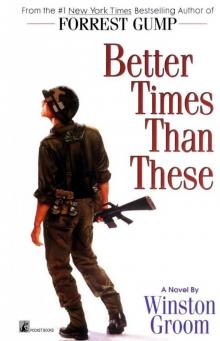 Better Times Than These
Better Times Than These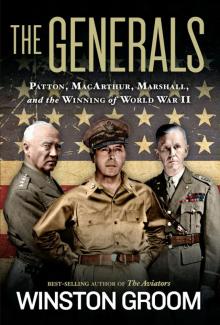 The Generals
The Generals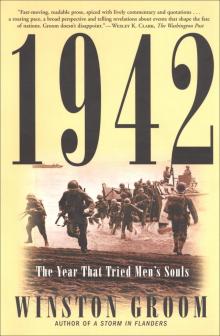 1942: The Year That Tried Men's Souls
1942: The Year That Tried Men's Souls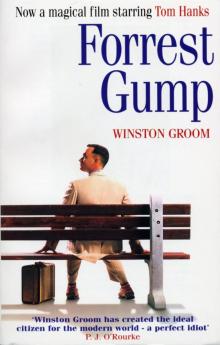 Forrest Gump
Forrest Gump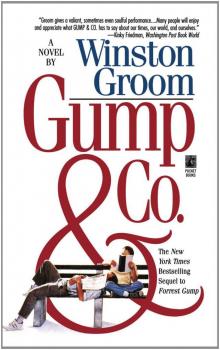 Gump and Co.
Gump and Co.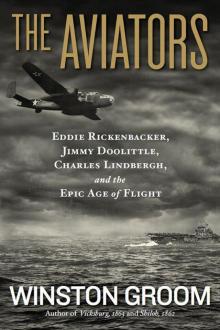 The Aviators
The Aviators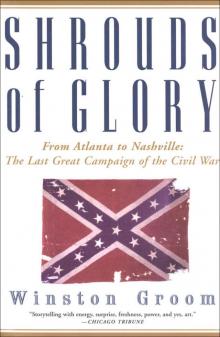 Shrouds of Glory
Shrouds of Glory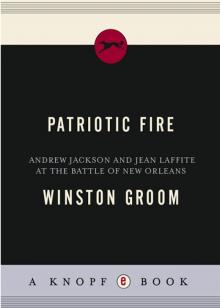 Patriotic Fire
Patriotic Fire Kearny's March
Kearny's March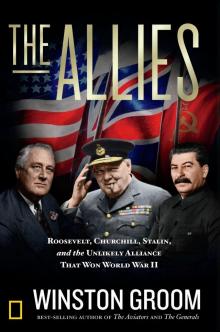 The Allies
The Allies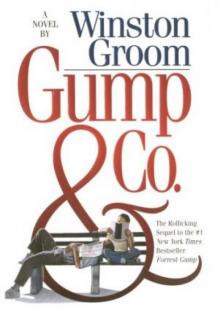 Gump & Company fg-2
Gump & Company fg-2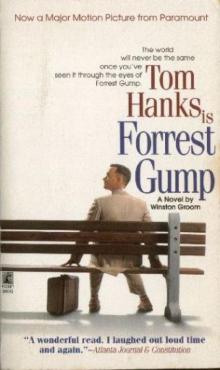 Forrest Gump fg-1
Forrest Gump fg-1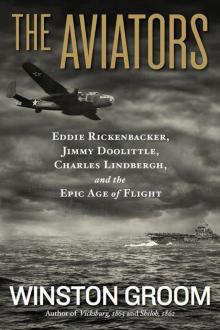 The Aviators: Eddie Rickenbacker, Jimmy Doolittle, Charles Lindbergh, and the Epic Age of Flight
The Aviators: Eddie Rickenbacker, Jimmy Doolittle, Charles Lindbergh, and the Epic Age of Flight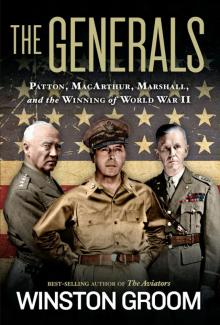 The Generals: Patton, MacArthur, Marshall, and the Winning of World War II
The Generals: Patton, MacArthur, Marshall, and the Winning of World War II